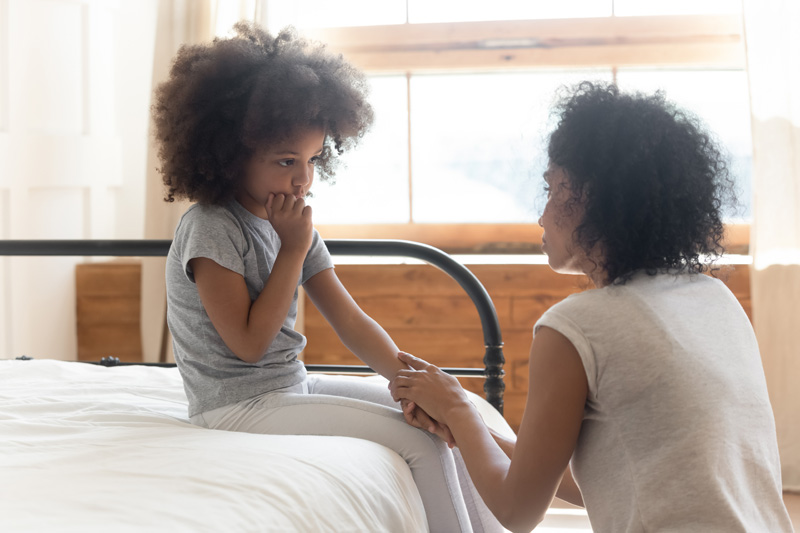My 5 year-old came home from kindergarten last week. Her face was furrowed and she looked concerned. She said to me, “Do you know about the Coronavirus?” and when I told her that I did, she said that you can die if someone coughs on you. Oy. And it got me to thinking about how such a pandemic (that most adults can’t even wrap their heads around) is now something that little kids have to grapple with, too. That’s why parents need to know how to talk to younger kids about Coronavirus, to assuage the fears for everyone.
With most of the country’s schools shut down for two weeks, you’d think that kids would be happy to get a surprise school vacation of sorts. Not really. Every day, my little one asks me how long the Coronavirus will last, so she can get back to school, her friends, and normal life. And try as I might to keep things entertaining (we’ve been crafting and baking all of these days), there’s still that sense of uncertainty that lingers in the air. “Much of the anxiety around COVID-19 stems from the uncertainty around the novel virus,” says Dr. Mary Mason, MD, an internist, mom and founder of Little Medical School. “Unlike the flu season that hits us every year, we don’t have a vaccine, medications that can lessen the symptoms and course of the infection, or the history to know how contagious it is, how much it will spread or how many people will develop serious complications or even die from it.” Plus, when you factor in the financial impact that some families are facing, and it’s easy to see why kids (and their parents) are stressed.
But if you want your child to be informed (and not afraid), use these tips to find the right words to learn how to talk to younger kids about Coronavirus. Hopefully it will help create some semblance of normalcy in these trying times.
Be Honest
The fact is that COVID-19 is scary. There is so much that is unknown, and as much as everyone is trying to #flattenthecurve, there’s no real way of knowing what’s to come. But that shouldn’t stop you from having an honest conversation with your kiddo. “It is very important to not hide the truth from children,” advises Dr. Soma Mandal, MD, a board-certified internist and partner at Summit Medical Group in Berkeley Heights, NJ. “Most kids have already have heard about it either at school and having a discussion about how to keep safe is important.” So springboard off of the information that your child already has (whether it’s accurate or not), and then have an open discussion of the facts as we know it right now.
Acknowledge Your Own Anxiety
There’s probably not one parent on the planet who isn’t stressed out by the novel virus, for one reason — or 10. That’s why you should check your own emotions to make sure that you’re not subconsciously passing them along to your kids. “You should recognize your own anxiety before talking to your child,” says Dr. Mandal. “If I am feeling particularly anxious in the moment, I choose not to talk to my child about the current issues; I allow myself to calm down and then approach the topic.” So be sure that you’re not stressed or upset when you speak to your child, so they can also remain calm, too.
Offer Reassurance
Right about now, you might feel like you need some reassurance yourself, which is why it’s even more important to offer it to your child. “Reassuring children is always important in addition to being honest,” says Dr. Mandal. “You can talk about how someone can get sick, but how you can protect yourself the best way you can. Washing hands with soap and water and singing the Happy Birthday song, covering a cough and sneeze, staying away from other sick people and eating healthy food/ getting plenty of sleep are what I call ways to ‘overpower the germs.’”
Try To Maintain A Routine
Listen, right about now, your kids are probably soaking up a lot of screen time—and that’s perfectly okay. The Coronavirus is truly a shock to the system, and as such, it’s going to take some time to adjust. So cut yourself some parental slack, but be sure to try to strive and keep some semblance of a routine, too. “Kids definitely do need their usual routines,” says Dr. Mandal. “Schools are closing indefinitely and they may feel confused about when things will return back to normal.” So keep their routines somewhat similar to what they were when they were in school, like making sure that they get to bed on time. For example, bedtime should still be as streamlined as possible, which means making sure that you keep the bath/book/bedtime routine every night, and ensure that they eat healthy meals.
It’s important to understand how to talk to younger kids about Coronavirus. If the pandemic is frightening for adults, it’s going to be even harder for kids to understand. But you will get through it, and things will eventually return to normal—for all of us. “Reassure your child that they will always be cared for and protected,” advises Dr. Mandal. “That makes any child feel that they are the most special child in the world, which they are.”



